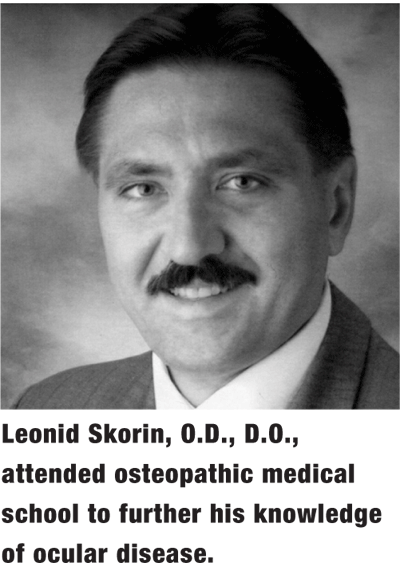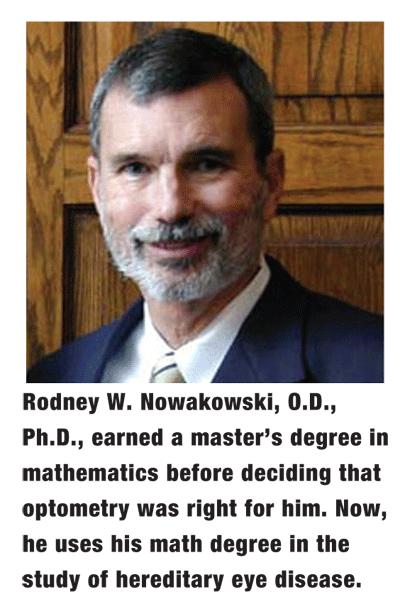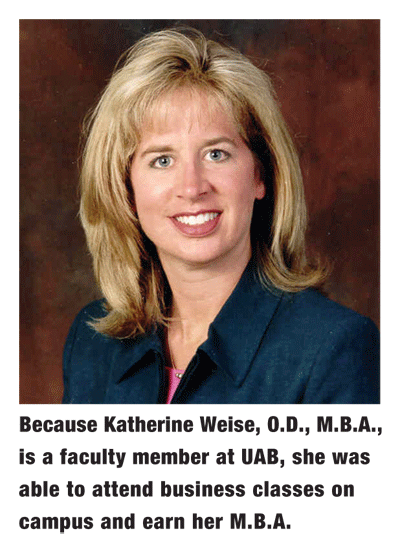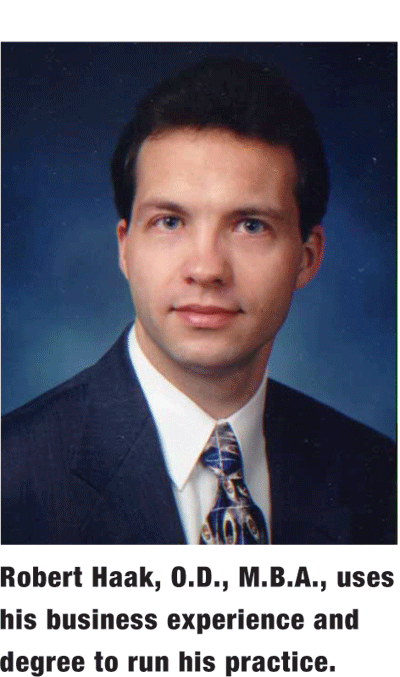
To some folks, the average optometrist might seem like an educational over-achiever. Many O.D.s will agree that completing eight years of higher education was more than enough for them. But, a select group of optometrists gives a whole new meaning to over-achiever. These O.D.s have earned other advanced degrees as well.
Imagine going to law or medical school or pursuing a Ph.D.after youve earned an O.D. Or, imagine enrolling in optometry school after youve already completed training as a nurse, engineer or veterinarian. This is exactly what these O.D.s did.
Why? Some of them wanted to trade up from their original careers because their personal or professional goals werent fulfilled. Others wanted to put a whole new spin on their optometry careers by adding J.D., D.O. or M.B.A. to their name.
A Change of Direction
Keith E. Watson, O.D., M.E., took a circuitous route to the optometry practice he owns in
By anyones standards, his career was off to a great start. He earned a masters degree in electrical engineering, installed cooling controls for a live nuclear reactor and worked for IBM for five years while helping to develop the Power PC microchip. But, the realities of an engineering career were making him unhappy.
Engineers usually work for large corporations, and unless you are a good follower, which Im not, you wont fit in, Dr. Watson says. Imagine working for nine bosses and having to get long projects done in one-fifth the time you really need. The stress was enormous. And, working for a large corporation meant that I was subject to downsizing at any time in my career.
His decision to go to optometry school was not met by universal approval. My mom thought I was nuts. I already had a careerone that she thought was successfulso, why would I want to change? he says. She also thought there wasnt as much prestige in optometry. But I think she has come around since she has seen that Ive been very successful in optometry.
Pete Hall, O.D., V.M.D., incited even more surprise when he announced to his family and veterinary clients in
I have been asked hundreds of times why I switched careers. I would say it was a variety of reasons, Dr. Hall explains. I burned out; it is a common malady of the veterinary profession. I became a bit bored. I cannot discount the mid-life crisis aspect. I was in my mid-40s and in a funk, with no goals to reach for.
He had always been interested in optometry; he had applied to optometry school at the same time he applied to veterinary school. Although returning to professional school after so many years was stressfulhe commuted to New England College of Optometry while his family stayed in
The professions are in many ways similar, and they both are terrific careers. I think, though, no matter how good a vocation may be, after many years it can get humdrum, he says. Putting yourself back into study mode, passing boards and starting again at the bottom of a profession can be humbling and rejuvenating at the same time.
Bruce Onofrey, O.D., Pharm.D., had a degree in chemistry and was looking for a guarantee of employment when he entered a pharmacy doctoral program. After practicing as a pharmacist, he became dissatisfied with the lack of interaction with patients.
The pharmacy practice didnt give me patient exposure; I wanted patient interaction and decision-making. Back then, in the 1970s, pharmacy was more of a count and pour thing. The job didnt hold my interest, Dr. Onofrey explains.
He enjoyed optometry school because it very quickly provided the patient interaction he craved. By the second year, I was into the clinics and interacting with patients directly. It was much more gratifying than pharmacy school, he says.
And, because Dr. Onofreys entry into optometry in 1982 just preceded the approval of TPA (therapeutic pharmaceutical agents) prescribing rights in many states, he was able to use his pharmacy background to create and teach TPA certification courses. He has been an adjunct faculty member at several optometry schools and is now a well-known lecturer on pharmaceuticals at major optometry meetings. He also is vice president of the Eye Group at
More is Better
For Leonid Skorin, O.D., D.O., optometry was his chosen professionafter he considered medicine and podiatry. While attending Illinois College of Optometry, he enjoyed learning about ocular disease, but at that time (1978 to 1982), most states did not have TPA laws. His mentor, also an O.D. and D.O., encouraged him to apply to osteopathic medical school.
 Dr. Skorin was accepted at the end of his fourth year at ICO. And, his newly minted O.D. degree enabled him to support himself through medical school. I worked as an O.D. in all kinds of different practice settings through my years in medical school and during my ophthalmology residency and neuro-ophthalmology fellowship, says Dr. Skorin. I even taught at Northeastern State College of Optometry (clinical module) during my medical internship in
Dr. Skorin was accepted at the end of his fourth year at ICO. And, his newly minted O.D. degree enabled him to support himself through medical school. I worked as an O.D. in all kinds of different practice settings through my years in medical school and during my ophthalmology residency and neuro-ophthalmology fellowship, says Dr. Skorin. I even taught at Northeastern State College of Optometry (clinical module) during my medical internship in
He took his interest in eye disease all the way to the Mayo Health System, where he now treats complicated cases. Although he doesnt recommend that aspiring ophthalmologists complete optometry training, adding four years to a nine-year medical training process, he finds his optometric skills to be beneficial.
As an ophthalmologist, I do find my optometry background very helpful. Even though optics was not my favorite topic in optometry school, it constantly helps me during my cataract implant evaluation and refractive surgery, he says.
Richard F. Multack, O.D., D.O., the mentor who advised Dr. Skorin to go to medical school, says he no longer offers this advice to optometrists.
My advice has changed because of the expanded scope of optometric practice and the issues of malpractice and declining reimburse- ments for physicians. My average ophthalmology resident owes about $250,000. If you add to that the cost of optometry school, a graduate will never make a living, says Dr. Multack, who is the ophthalmology resident training director at
He does believe that his optometric education was valuable, however. My optometric experience made me a better physician because of the extra maturity and discipline I achieved by going to ICO, as well as the coaching, mentoring and education I received at ICO.
Craig Steinberg, O.D., J.D., has carved a unique niche for himself by combining optometry and law. A practicing optometrist for 18 years before attending law school, he never intended to practice law. Nevertheless, he was drawn into a legal practice by clients who needed a lawyer with a strong eye-care and health-care background.
In 1997, the issue of mail-order vendors selling contact lenses without a prescription was hot. A group of optometrists urged me to file suit. That got me some notoriety. Then another lawyer hired me to write and assist with a difficult case. Another lawyer who had represented an ophthalmologist in a case that I was involved in asked me to work for him and handle cases, he says.
As Dr. Steinbergs law practice grew, he hired one and then two O.D.s to work in his optometry practice in
A law practice does not require me to be in my office to make a living. I could take my daughter to soccer matches, go to my sons golf matches. I am an active, competitive golfer, and Im away for six to eight weeks a year. I can schedule litigation accordingly and even work from my hotel room, he says.
 Rodney W. Nowakowski, O.D., Ph.D., originally earned a masters degree in mathematics before selecting optometry as a career. He specialized in low vision rehabilitation and established a permanent eye clinic on the campus of Alabama Institute for the Deaf and Blind.
Rodney W. Nowakowski, O.D., Ph.D., originally earned a masters degree in mathematics before selecting optometry as a career. He specialized in low vision rehabilitation and established a permanent eye clinic on the campus of Alabama Institute for the Deaf and Blind.
I saw so many children with hereditary vision loss that I felt I needed to learn more about it, he says. I took a few courses in medical genetics at
Now the optometry chief of staff at the
Do It for Yourself
Most optometrists with additional degrees say they originally sought more graduate education as personal enrichmentand, they add, this may be the best reason to commit to additional study.
I went to law school because I was interested in the law. I didnt plan to practice law or even take the bar exam, says Dr. Steinberg. There is no downside to going to law school. You learn things that will help you, whether you practice law or not.
Kimberly Lambreghts, R.N., O.D., admits that she chose a convoluted route when she completed a nursing program before attending optometry school. Although it was not a recommended pre-optometry curriculum (and left her short on prerequisites for optometry school), it did provide a valuable perspective.
I just wasnt sure if caring for patients was for me. I wanted to have that experience before spending four years in optometry school. Nursing was an undergraduate program that provided me with the opportunity to interact with patients, and I found that I enjoyed it quite a lot, says Dr. Lambreghts, who is now the director of family practice service at the University of Houston College of Optometry.
 Katherine Weise, O.D., M.B.A., thought she was done with school after earning her O.D., but she realized that she wanted to know more about business before going into private practice. As a faculty member at UAB, taking courses at the business school was convenient, and her status as part-time student allowed her to defer her optometry school loans.
Katherine Weise, O.D., M.B.A., thought she was done with school after earning her O.D., but she realized that she wanted to know more about business before going into private practice. As a faculty member at UAB, taking courses at the business school was convenient, and her status as part-time student allowed her to defer her optometry school loans.
It was fun, but it took me five years to complete the M.B.A. along with working full-time at UAB, says Dr. Weise, who is now director of pediatric optometry at the school.
She never did go into private practice, but she says that the M.B.A. enables her to bring proven business knowledge to discussions about the UAB clinic operations and development.

Robert G. Haak, O.D., M.B.A., says that he applies his business degree often while operating a solo practice in
I was hoping to build my business and leadership abilities, he says. The M.B.A. program dealt with many areas pertinent to running a business, including accounting, economics, marketing, management and finance. The training was well rounded and provided many skill development experiences.
And, although he hadnt planned for an optometry career, the M.B.A. background has been helpful since he completed optometry school in 2000, he acknowledges.
The application of strategic thinking has helped me to achieve targeted practice growth, while the management training contributes to daily practice operations, says Dr. Haak. Because there is so little time for business training in the optometry curriculum, I recommend an M.B.A. program for any optometric setting.
Whether these O.D.s actually attained their original goals by going back to school, they each learned something new and important about themselves and their practices. The M.B.A. gave me much more confidence in running a private practice and in taking on leadership positions in optometry societies, says Dr. Haak.
Adds Dr. Nowakowski: These degrees will open doors for you in terms of faculty and research opportunities.

